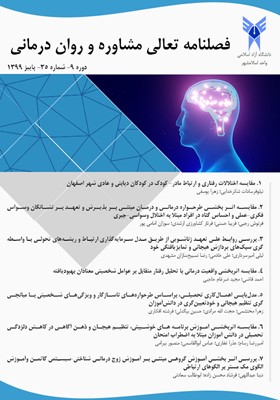بررسی روابط علی تعهد زناشویی از طریق مدل سرمایهگذاری ارتباط و ریشههای تحولی با واسطهگری سبکهای پردازش هیجانی و تمایزیافتگی خود
محورهای موضوعی : فصلنامه تعالی مشاوره و روان درمانیلیلی امیرسرداری 1 , علی خادمی 2 * , رضا تسبیحسازان مشهدی 3
1 - گروه روانشناسی، واحد ارومیه، دانشگاه آزاد اسلامی، ارومیه، ایران
2 - گروه روانشناسی، مرکز تحقیقاتی روانشناسی، واحد ارومیه، دانشگاه آزاد اسلامی، ارومیه، ایران
3 - گروه روانشناسی، واحد ارومیه، دانشگاه آزاد اسلامی، ارومیه، ایران
کلید واژه: تعهد زناشویی, تمایزیافتگی خود, مدل سرمایهگذاری ارتباط, ریشههای تحولی, سبکهای پردازش هیجانی,
چکیده مقاله :
هدف: هدف این پژوهش بررسی روابط علی تعهد زناشویی از طریق مدل سرمایهگذاری ارتباط و ریشههای تحولی با واسطهگری سبکهای پردازش هیجانی و تمایزیافتگی خود بود. روش: این مطالعه توصیفی از نوع همبستگی بود. جامعه پژوهش دانشجویان مرد و زن متأهل دانشگاه آزاد اسلامی واحد قزوین در سال تحصیلی 97-1396 به تعداد 1416 نفر بودند. حجم نمونه بر اساس فرمول کوکران 302 نفر برآورد شد که با روش نمونهگیری تصادفی خوشهای انتخاب شدند. ابزارهای پژوهش پرسشنامههای تعهد زناشویی آدامز و جونز (1997)، سرمایهگذاری ارتباط راسبلت (1980)، فرزندپروری یانگ و کلوسکو (1993)، سبکهای پردازش هیجانی باکر و همکاران (2007) و تمایزیافتگی خود دریک (2011) بودند. دادهها با روش مدلیابی معادلات ساختاری در نرمافزار ایموس تحلیل شدند. یافتهها: یافتهها نشان داد که مدل سرمایهگذاری ارتباط و ریشههای تحولی بر پردازش هیجانی، تمایزیافتگی خود و تعهد زناشویی تاثیر مستقیم و معنادار و پردازش هیجانی و تمایزیافتگی خود بر تعهد زناشویی تاثیر مستقیم و معنادار داشت (01/0p نتیجهگیری: بر اساس نتایج مطالعه حاضر برای بهبود تعهد زناشویی دانشجویان متأهل میتوان برنامههایی برای ارتقای مدل سرمایهگذاری ارتباط، ریشههای تحولی، سبکهای پردازش هیجانی و تمایزیافتگی خود در آنها طراحی و از طریق کارگاههای آموزشی اجرا کرد.
Purpose: The aim of this research was investigation the causal relationships of marital commitment through relationship investment model and roots development with mediated of emotional processing styles and self-differentiation. Methodology: This study was a descriptive from type of correlation. The research population was married male and female students of Islamic Azad University of Qazvin branch in the 2017-18 academic years with number 1416 people. The sample size was estimated based on Cochran's formula 302 people who were selected by cluster randomly sampling method. The research tools were the questionnaires of Adams and Jones marital commitment (1997), Result relationship investment model (1980), Young and Klosko parenting (1993), Baker and et all emotional processing styles (2007) and Drake self-differentiation (2011). Data were analyzed by structural equation modeling method in Amos software. Findings: The findings showed that relationship investment model and roots development on emotional processing styles, self-differentiation and marital commitment had a direct and significant effect and emotional processing styles and self-differentiation on marital commitment had a direct and significant effect (p < 0.01). Also, the relationship investment model with mediated of emotional processing styles and self-differentiation on marital commitment and roots development with mediated of self-differentiation on marital commitment had an indirect and significant effect (p < 0.01), but roots development with mediated of emotional processing styles had not an indirect and significant effect (P>0.05). Conclusion: Based on the results of present study, to improve the marital commitment of married students can be designed programs to promote their relationship investment model, roots development, emotional processing styles and self-differentiation and implemented through workshops.
_||_

